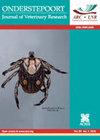IF 1.6
3区 农林科学
Q2 VETERINARY SCIENCES
Onderstepoort Journal of Veterinary Research
Pub Date : 2021-06-22
DOI:10.22059/JVR.2020.286511.2954
引用次数: 0
摘要
背景:为了获得最大的健康和经济效益,寻找最安全的食品防腐剂是至关重要的。肠炎沙门氏菌是导致沙门氏菌病的原因,沙门氏菌病是家禽中最重要的食源性人畜共患病之一。目的:比较评价黄柏、百里香、莪术挥发油和甲醛对肠炎沙门氏菌的抑菌作用。方法:采用高倍稀释法测定莪术油、黄芪油和麝香精油对肠炎沙门氏菌的最低抑菌浓度(MIC)和最低杀菌浓度(MBC)。并评价了精油对肠炎沙门氏菌生长曲线的影响。结果:本研究确定黄松、百里香、肉桂和甲醛对肠炎沙门氏菌的最低抑菌浓度MIC分别为500、700、500、70 ppm, MBC分别为700、900、1000、200ppm。本研究发现,所有处理均增加滞后期。各浓度下黄芪的细菌生长速度均较慢,其余各浓度间仅1、2 MIC差异显著(p <0.05)。结论:浓度较低的黄松、百里香和浓度较高的黄樟可替代一定比例的甲醛,防止食品中细菌的滋生。本文章由计算机程序翻译,如有差异,请以英文原文为准。
بررسی اثرات ضدمیکروبی اسانسهای گیاهی دارچین، زنیان، آویشن باغی و فرمالدهید بر باکتری سالمونلا انتریتیدیس
BACKGROUND: It is fundamental to find the safest food preservatives in order to acheive the maximum health and economic benefits. Salmonella enteritidis is the cause of Salmonellosis, one of the most important foodborn zoonoses in poultry. OBJECTIVES: The present study was conducted to comparatively evaluate the antimicrobial effects of Trachyspermum copticum, Thymus vulgaris, and Cinnamomum zeylanicum essential oils and Formaldehyde against Salmonella Enteritidis. METHODS: In this study minimum inhibitory concentration (MIC) and minimum bactericidal concentration (MBC) of Cinnamomum zeylanicum, Trachyspermum copticum, and Thymus vulgaris essential oils against Salmonella enteritidis were determined using broth macro-dilution. The effects of essential oils on growth curve of Salmonella Enteritidis were also evaluated. RESULTS: In this study, MIC for the minimum inhibitory concentration level of Trachyspermum copticum, Thymus vulgaris, Cinnamomum zeylanicum and formaldehyde for Salmonella Enteritidis was determined as 500, 700, 500, and 70 ppm while MBC was calculated as 700, 900, 1000, and 200ppm, respectively. This study revealed that all the treatments increased lag phase. Bacterial growth speed was slower for Trachyspermum copticum of all the concentrations, yet a significant difference was observed only in 1 and 2 MIC of other treatments (p <0.05). CONCLUSIONS: In conclusion, Trachyspermum copticum (with less concentration), Thymus vulgaris, and Cinnamomum zeylanicum (with higher concentration) could be employed as a substitution of a proporation of formaldehyde to prevent bacterial development in food.
求助全文
通过发布文献求助,成功后即可免费获取论文全文。
去求助
来源期刊
CiteScore
4.30
自引率
0.00%
发文量
13
审稿时长
16 weeks
期刊介绍:
The Onderstepoort Journal of Veterinary Research, is the official publication of the Onderstepoort Veterinary Institute. While it considers submissions from any geographic region, its focus is on Africa and the infectious and parasitic diseases and disease vectors that affect livestock and wildlife on the continent.

 求助内容:
求助内容: 应助结果提醒方式:
应助结果提醒方式:


